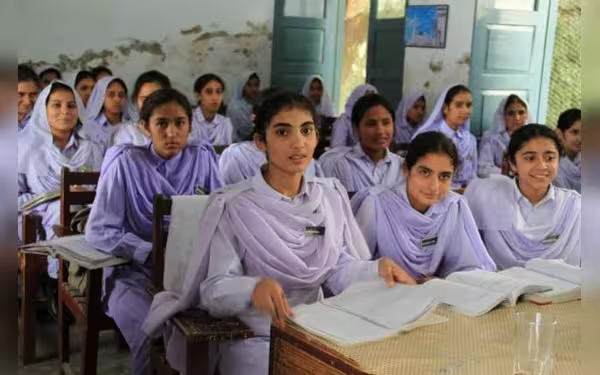Saturday, November 16, 2024 07:05 PM
KP Assembly Raises Concerns Over Government School Expenditure
- Government spends Rs 7,000 per child in public schools.
- Public school performance remains disappointing despite funding.
- Khyber Pakhtunkhwa relies 93% on federal education funding.
 Image Credits: urdupoint
Image Credits: urdupointKP Assembly discusses concerns over high expenditure on government schools amid disappointing performance.
The Khyber Pakhtunkhwa Assembly Standing Committee on Finance recently held an introductory meeting to discuss the pressing issues surrounding government schools in the province. Chaired by Arbab Muhammad Usman, the meeting raised significant concerns regarding the performance of these schools and the financial resources allocated to the education sector.
During the meeting, various members, including finance advisor Muzamil Aslam and Special Secretary Abid Ullah Kakakhel, were present to address the challenges faced by public sector education. A key point of discussion was the alarming fact that the government spends approximately Rs 7,000 on each child enrolled in public schools. Despite this substantial investment, the performance of these schools has been described as disappointing.
It was highlighted that the expenditure on students in government schools is considerably higher than the fees charged by private institutions. This raises a critical question: why are public schools not delivering better results despite the increased funding? The committee members expressed their concerns and called for a thorough review of the education system to understand the underlying issues.
Furthermore, the meeting revealed that Khyber Pakhtunkhwa relies heavily on federal funding, receiving 93 percent of its financial resources from the federal government, while only 7 percent is generated locally. This dependency on external funding underscores the need for a more sustainable financial model for education in the province.
In addition to the education budget, it was noted that Rs 37 billion has been allocated for the Sehat Plus Card this year, which aims to provide health coverage to citizens. The finance advisor also mentioned that the provincial government is receiving Rs 66 billion from the federal government to cover the salaries of merged district employees. However, there remains a salary shortfall of Rs 104 billion, indicating a significant gap that needs to be addressed.
The concerns raised during this meeting reflect a broader issue within the education system in Khyber Pakhtunkhwa. The heavy financial investment in public schools has not translated into improved performance, prompting the need for a comprehensive evaluation of the education policies and practices in place. As stakeholders in the education sector, it is crucial to ensure that every child receives a quality education, which is not only a right but also a foundation for a prosperous future. The government must take decisive action to address these challenges and work towards creating a more effective and efficient education system for all students.













